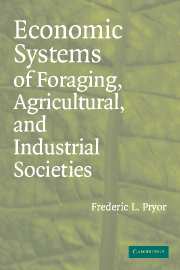9 - Conclusions and an Agenda for Future Research
Published online by Cambridge University Press: 06 July 2010
Summary
This study applies a uniform method of analyzing economic systems at various stages of development, ranging from foraging to advanced industrial/service economies. Although such an approach does not result in a generalized “theory of economic systems,” whatever that may mean, it does permit us to discover for economies with any given focus of production an important order arising out of the chaos of case studies, statistics, anecdotes, and factoids that govern most discussions. As a result, theorizing can begin about their institutional orders from a solid empirical base.
The most important empirical results can be quickly summarized: Economies at every stage of development feature a small number of distinct economic systems, defined in terms of particular groups of institutions that cluster together. From the statistical analysis presented in previous chapters, many of these economic systems do not seem to be generally determined by the social structure, political organization, or physical environment of the societies but rather appear as independent entities, worthy of study in their own right.
These economic systems provide an analytical framework within which a variety of economic activities can be placed in context and examined. Designation of the economic system also allows us to distinguish those characteristics typical of all societies with the same focus of production from those that are shared only by those societies with the same system and those that are unique to a given society. Moreover, in certain cases, these economic systems have an important impact on the performance of the economy.
- Type
- Chapter
- Information
- Publisher: Cambridge University PressPrint publication year: 2005



